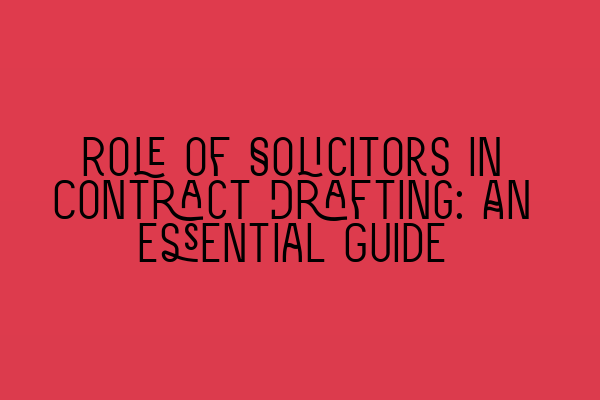Solicitors play a crucial role in contract drafting. Their expertise in legal principles and their understanding of the intricacies of contract law make them invaluable in ensuring that contracts are properly drafted, negotiated, and executed. In this guide, we will discuss the role of solicitors in contract drafting and how their involvement can help protect the interests of parties involved.
The Importance of Solicitors in Contract Drafting
When it comes to contract drafting, precision and attention to detail are essential. A slight oversight or ambiguity in the contract’s wording can have far-reaching consequences for the parties involved. This is where solicitors shine.
A solicitor’s role in contract drafting involves several key tasks:
- 1. Assessing the Legal Requirements: Solicitors have extensive knowledge of contract law and understand the legal requirements that must be fulfilled for a contract to be legally binding. They can assess the specific needs and objectives of the parties involved and ensure that the contract meets all necessary legal criteria.
- 2. Drafting the Contract: Solicitors are skilled at drafting clear and concise contracts that accurately reflect the intentions of the parties. They can use their legal expertise to ensure that the contract covers all relevant aspects, including the rights and obligations of each party, payment terms, dispute resolution mechanisms, and termination clauses.
- 3. Negotiating Terms: In many instances, contract negotiations are required before reaching a final agreement. Solicitors act as intermediaries, representing their clients’ interests and negotiating favorable terms. They can provide legal advice during the negotiations, protecting their clients from potential pitfalls and facilitating a fair outcome.
- 4. Reviewing and Amending: Solicitors meticulously review the contracts before they are executed to identify any discrepancies or ambiguities that may exist. They can suggest amendments or clarifications to ensure that the contract accurately reflects the intentions of the parties and is in their best interests.
- 5. Ensuring Compliance: Once the contract is in effect, solicitors can monitor its compliance to ensure that both parties adhere to the agreed-upon terms. If any issues arise, solicitors can provide legal guidance and represent their clients in dispute resolution processes.
Benefits of Involving Solicitors in Contract Drafting
While it may be tempting for parties to draft contracts themselves or rely on standardized templates, involving solicitors in the process offers significant benefits:
- 1. Legal Expertise: Solicitors possess comprehensive legal knowledge and experience in contract law. They can identify potential risks and pitfalls that may not be evident to non-legal professionals. Their expertise helps ensure that the contract is legally enforceable and protects the client’s interests.
- 2. Tailored Contracts: Each contract is unique and should be customized to reflect the specific needs and objectives of the parties involved. Solicitors can draft contracts that address the specific concerns of each party, ensuring that their client’s interests are protected and the contract is fair.
- 3. Risk Mitigation: Solicitors can identify and mitigate potential risks associated with the contract. They can insert appropriate clauses to protect their clients, such as limitation of liability clauses or indemnification provisions. This helps minimize the potential for future disputes or legal issues.
- 4. Efficient Negotiations: Solicitors excel in negotiating complex legal matters. Their presence during contract negotiations can lead to more favorable outcomes for their clients. They can guide the negotiation process, address concerns, and ensure that the final agreement is fair and satisfactory.
- 5. Peace of Mind: By involving solicitors in contract drafting, parties can have peace of mind knowing that their interests are protected. Solicitors offer reassurance and serve as a safeguard against potential legal problems down the line.
With the complex nature of contract law, involving solicitors in the drafting process is not only beneficial but often necessary to ensure that the contract is legally sound and serves the best interests of all parties involved.
If you are preparing for SQE exams or looking for SQE preparation courses, you may find the following articles helpful:
- SQE 1 Practice Exam Questions
- SQE 1 Practice Mocks FLK1 FLK2
- SQE 2 Preparation Courses
- SQE 1 Preparation Courses
For information on upcoming SRA SQE exam dates, visit: SRA SQE Exam Dates.
